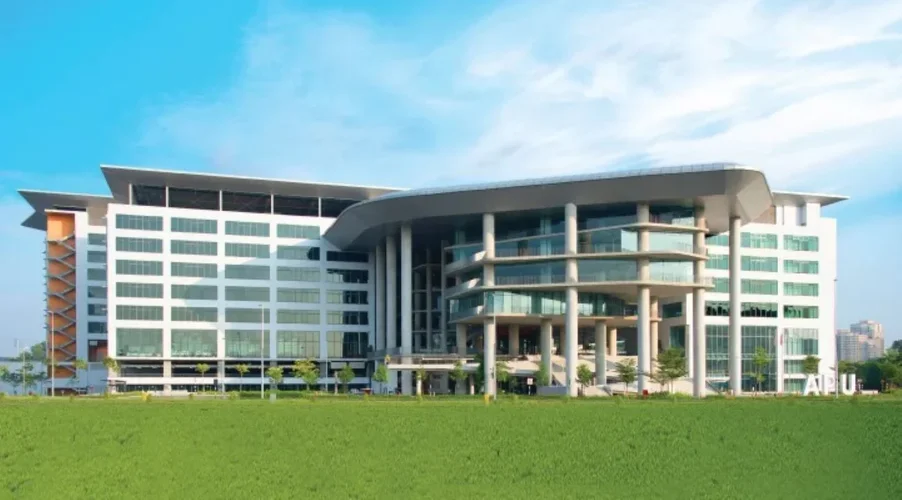Datuk Parmjit Singh, CEO of APU (left) signs a Memorandum of Agreement with representatives from the nine universities in a virtual signing ceremony, witnessed by Prof. Ir. Ts. Dr. Vinesh Thiruchelvam, the Chief Innovation & Enterprise Officer of APU.
In line with the National Entrepreneurship Policy (NEP), a long-term strategy for Malaysia to become an outstanding entrepreneurial nation by 2030, Asia Pacific University of Technology & Innovation (APU) further expanded its Experiential Entrepreneurship Education by collaborating with nine universities in ASEAN and Africa, to build capacity in supporting start-up and spin-out companies, as well as to exchange knowledge and skills among faculty.
The collaboration was formalised through a Memorandum of Agreement signed by Datuk Parmjit Singh, CEO of APU, and representatives from the nine universities in a virtual ceremony held 10 March, witnessed by Prof. Ir. Ts. Dr. Vinesh Thiruchelvam, the Chief Innovation & Enterprise Officer of APU.
The nine universities are Tra Vinh University and Can Tho University, Vietnam; Universitas Trisakti, Universitas Indonesia, and Telkom University, Bandung from Indonesia; Palawan State University, Philippines; the Chea Sim University of Kamchaymear, Cambodia; National University of Laos; and the University of Mpumalanga, South Africa.
This collaboration includes mutual visits, access to facilities in the incubation centres, advisory to start-up/spin-off companies on regulatory requirements, understanding of the market in each parties’ countries and joint research relating to entrepreneurship.
“The collaboration with the nine universities will give all partners access to support and facilities in an incubation centre, along with mentor sharing and training sessions for start-up companies and the sharing of curriculum and teaching materials related to entrepreneurship programmes. Students can also participate in the ideation boot camps, entrepreneur competition, and accelerator programmes,” elaborated Parmjit.
Collaboration in entrepreneurship initiatives plays a crucial role in the upcoming ASEAN Economic Community, as ASEAN has a workforce of more than 400 million, with a combined GDP of 2.4 trillion dollars while also being rich in natural resources. It would allow ASEAN, to be among the top 10 economic powers in the world.
As the ASEAN market size is so massive, regional entrepreneurship allows the startups to collaborate with firms from other countries making the process easier and smoother which would bring more benefit to both the parties involved and create the opportunity to catalyze creative solutions to long-standing problems, promote research, and energize social change.
Regional entrepreneurship collaborations are also important to create market opportunities for start-ups, where governments of Malaysia and Indonesia saw a Memorandum of Understanding on the cooperation in the field of entrepreneurship education signed on 20 November 2021.
Through this cross-border enterprise programme, APU students, as well as students from the above nine universities, could apply their talent and technical expertise and venture into entrepreneurship while they are still studying in institutions of higher learning.
In his speech, Datuk Parmjit noted that APU’s Enterprise@APU programme “Better equips student-entrepreneurs by providing a holistic entrepreneurial ecosystem. It brings together the best content for entrepreneurship education and is based on elements that foster entrepreneurial culture and mindset. This network will foster a thriving entrepreneurial community both on and off-campus”.
His Excellency Dr. Touch Visalsok, Secretary of State, Ministry of Education, Youth and Sport of Cambodia stated, “The MoA will help strengthen the collaboration on entrepreneurial skills of CSUK students and staff with those of APU and other consortium universities, and contribute towards the development of SME in Cambodia”.
Prof. Dr. Ha Thanh Toan, Rector of Can Tho University, Vietnam remarked, “We are very happy to join this network where students can not only join incubator activities but also exchange their cultures. We will do our best to support the network activities successfully.”
Assoc. Prof. Dr. Pham Tiet Khanh, Rector of Tra Vinh University, Vietnam added, “I hope that we will undertake many collaborative activities in the coming time.”
“The signing of the MoA will provide a platform for strategic international cooperation among the participating institutions. This will contribute towards the realisation of our strategic goal of sustainable development through innovation,’’ said Prof. Thoko Mayekiso, Vice-Chancellor of the University of Mpumalanga, South Africa.
Dr. Ramon M. Docto, President of Palawan State University, Philippines stated “PSU together with Palawan International Technology Business Incubator, Department of Science and Technology MIMAROPA (DOST-MIMAROPA) and APU will strive to provide relevant and innovative education and research in entrepreneurship”.
Assoc. Prof. Dr. Somchanh Bounphanhmy of the National University of Laos said, “This collaboration will provide more opportunity for NUOL staffs and students to enhance entrepreneurship knowledge and skills”.
Dr. Nurtami, Vice-Rector for Research and Innovation, Universitas Indonesia (UI) opined, “Through the establishment of this multinational and multicultural collaboration, UI wants to escalate the incubation programme to the next level, by involving more diverse perspectives. Cross borders research collaborations are critical and strategic in driving greater impacts for the community, particularly in academics, society, and the economy.
“Universitas Trisakti is honoured to partner with the Asia Pacific University of Technology and Innovation. This partnership allows students and academic staff to increase their innovative and entrepreneurial capacity and to conduct cross-cultural interactions among the young generation coming from both and other universities,” said Prof. Dr. Ir. Kadarsah Suryadi DEA, Rector of Universitas Trisakti, Indonesia.
Dr. Koredianto Usman, Director of Bandung Techno Park, Telkom University, Indonesia chimed in with agreement, “Yes, together we are stronger!”
- End -
 +60173309581
+60173309581






